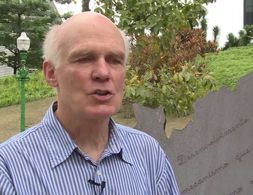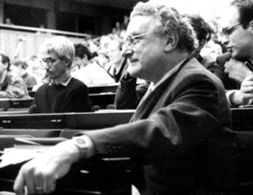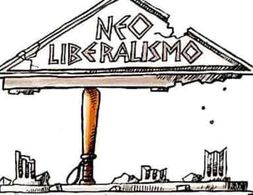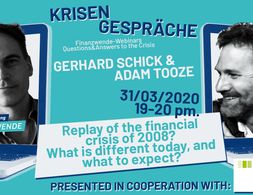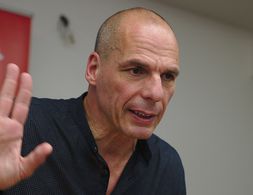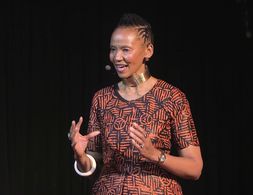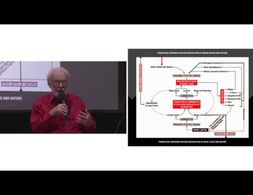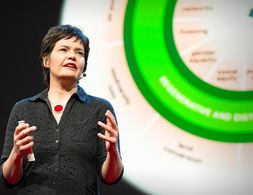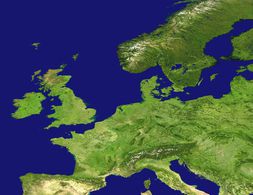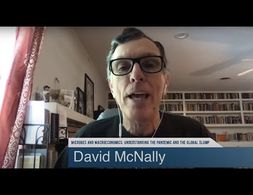✕
1047 results
This lecture is all about the challenge to include heterodox approaches into macroeconomics. After giving an overview of recent approaches to that problem Professor Michael Roos presents the theoretical framework of Complexity Economics as a means to combine behavioral aspects with macroeconomics.
Prof. Robert Wade (London School of Economics, UK) discusses industrial policy, the challenges of economic development for emerging countries like Brazil and...
UBC's Henry Siu, a professor at the Vancouver School of Economics, speaks about innovation in economics, technological progress and what it means for the fut...
The MINE website explores the interplay between nature and economy. Focusing on such fundamental concepts as time, thermodynamics, evolution, homo politicus and justice, a new outline of economic activity emerges within nature. The dominant approach of Mainstream Economics, which considers nature as a subsystem of the economy, is thus replaced by a broader and more integrated framework. The visual map and its links between concepts provides an orientation. The visitor can approach the content from their own starting point and follow their own path to discovery. Each concept starts with the historical background and moves on through theory and practice.
The research behind MINE began in the 1970s at the University of Heidelberg, Germany, in an interdisciplinary group spearheaded by Professor Malte Faber, including scientists from economics to mathematics, physics and philosophy. The research has contributed to the field of Ecological Economics.
MINE is directed at students, scientists and decion-makers. More on http://nature-economy.de/faq/
This infographic gives a summary of the 2018 Trade Wars. This simple, compiled overview is suitable for those without a strong political or economic background.
The infographic explains briefly basic concepts related to trade and provides a short timeline of events. It furthermore checks Trump administration's arguments to launch the the trade war against facts and estimates of how the 2018 trade war can affect the global and North-American economy.
Since Daniel Kahneman won the Nobel Memorial Price in Economic Sciences in 2002, a new branch of economics gained academic and popular interest. That is, the so-called area of behavioural economics. However, some scholars claim that this new area of economics is not changing much of the mainstream paradigm. Why?
Ernest Mandel, a heterodox Marxist economist, shows here how a political economist can analyse systems such as the Soviet Union.
El artículo crítica los fundamentos de la síntesis teórica actual que domina el pensamiento económico, conocida como Equilibrio General Dinámico Estocástico (GDSE por sus siglas en Inglés). Analiza la perspectiva de la crítica de Kuhm a los paradigmas científicos. Y concluye que la política económica basada en esta perspectiva no necesariamente conduce al bienestar general.
In this blog article Steve Keen elaborates on flawed climate change modelling and mainstream economics forecasts. In specific, he stresses the climate change forecasts of the DICE model (“Dynamic Integrated model of Climate and the Economy”) by Nobel Memorial Prize in Economic Sciences winner William Nordhaus.
What data is used in the economic models of the IPCC? How problematic is it, that tipping points are often ignored? A very interesting presentation by Steve Keen during the OECD Conference "Averting Systemic Collapse".
In this article, Gareth Dale analyzes and compares the main characteristics and differences of two visions that are currently emerging to tackle Climate Change: the Green New Deal and Degrowth. Which are the consequences from the environmental, economic and political point of view? And what are the underlying doctrines?
Ever wondered how a rap battle between John Maynard Keynes and F.A. Hayek would sound like?
This Blog Post describes the U.S. federal reserve money system from the perspective of the Modern Monetary Theory (MMT). Therefore it presents a theory of money creation, gives simple examples how this influences the economy and the historical process of why the monetary system of the US has developed this way.
Currency hierarchy and policy space: A research agenda for development economics Barbara Fritz
The world is coping with a global disaster, as the new Coronavirus takes a toll on many lost lives and a severe impact on economic activity. To provide a long-run perspective, this column documents the international response to a variety of disasters since 1790. Based on a new comprehensive database on loans extended by governments and central banks, official (sovereign-to-sovereign) international lending is much larger than generally known. Official lending spikes in times of global turmoil, such as wars, financial crises or natural disasters. Indeed, in these periods, official capital flows have repeatedly surpassed total private capital flows in the past two centuries. Wars, in particular, were accompanied by large surges in the volume of official cross-border lending.
For some days, global financial markets are in turmoil. Central banks and governments are dealing with the unfolding crisis on a daily basis with seemingly u...
Yanis Varoufakis, former finance minister of Greece and the co-founder of the international DiEM25 platform, discusses the economic and political impacts of the Covid-19 Pandemic, in particular with regards to the Eurozone and southern European countries.
This talk is an exploration of a feminist centred world, where women's labour, women's energy, women's contributions to the economy are not a side event but the main event.
John Christensen from the Tax Justice Network addresses the Modern Monetary Theory idea that governments don't need tax revenues if they want to spend money. Doing so, he sums up the main points made by MMT proponents and their critics, and shows how MMT can be reconciled with another progressive economic narrative: "Modern Tax Theory". While MMT made valuable contributions to the policy debate on fiscal policy, it misrepresents the importance of taxation as a political matter and as a way to generate public revenues. This is where MMT steps in.
Marxist scholar David Harvey explains key concepts of capital from Marx. Applying Marx's analysis of capital to today's world, showing both the longevity and relevance of Marx's Capital, 150 years after its publication.
In this Ted Talk, Oxford economist Kate Raworth argues that instead of prioritizing the growth of nations, the world should rather prioritize meeting the needs of all people living on the planet within ecological limits.
As part of a larger series on Just Transitions, the author describes how the current corona crisis comes with new economic policy responses which would have been considered unthinkable only a year ago. Arguing that with the current high levels of confidence in politicians and scientific advice, combined with the realisation that the market has not been able to solve this problem on its own, we are now in a unique position to implement a radically different solution than was politically possible previously.
In this virtual teach-in, radical economists David McNally (author of the essential Global Slump) and Hadas Thier (author of the forthcoming A People’s Guide to Capitalism) will try to help activists make sense of the twists, turns, and sudden collapses in the world economy that have been playing out in the background during this global health emergency.
An analysis of the modern neoliberal world, its characteristics, flaws and planetary boundaries aiming to end new economic politics and support a global redistribution of power, wealth and roles.
In this online lecture, economist and Professor at the School of Oriental and African Studies (SOAS), London, UK. Costas Lapavitsas, explains the limitations of the neoliberal market in creating financial stability and growth in both, developing and developed countries.
In this series of webinars, several researchers face different topics related to Degrowth. Money, health, Green New Deal, Anarchism, and many more.
In this short podcast, Naomi Fowler, the Tax Justice Network's creative strategist, discusses how the laws made by those who profited from slavery and the empire and, the extractive business models of the major financial sector continue to impoverish some of the poorest nations.
Most mainstream neoclassical economists completely failed to anticipate the crisis which broke in 2007 and 2008. There is however a long tradition of economic analysis which emphasises how growth in a capitalist economy leads to an accumulation of tensions and results in periodic crises. This paper first reviews the work of Karl Marx who was one of the first writers to incorporate an analysis of periodic crisis in his analysis of capitalist accumulation. The paper then considers the approach of various subsequent Marxian writers, most of whom locate periodic cyclical crises within the framework of longer-term phases of capitalist development, the most recent of which is generally seen as having begun in the 1980s. The paper also looks at the analyses of Thorstein Veblen and Wesley Claire Mitchell, two US institutionalist economists who stressed the role of finance and its contribution to generating periodic crises, and the Italian Circuitist writers who stress the problematic challenge of ensuring that bank advances to productive enterprises can successfully be repaid.
We collect selected high quality working papers from the leading international universities and research institutes in the field of plural and heterodox economics. The working papers in our selection present economic schools of thought and debates in a first-class way and give an insight into the latest research.
The documentary features a talk of the US-American writer and economic theorist Jeremy Rifkin summarising the main points of his 2011 book "The Third Industrial Revolution."
Global Value Chains (GVCs) started to play an increasing and key role in the global economy from the 1990s on. The market mechanism in GVCs supports industrialisation in the Global South and under certain conditions product and process upgrading. But GVCs do not lead to the catching-up of countries in the sense of them approaching real GDP per capita levels comparable with developed countries. These arguments are supported by a critical interpretation of the traditional trade theory, the New Trade Theory and specific approaches to explain GVCs, especially different governance structures and power relationships. Several case studies support these arguments. For catching-up, countries need comprehensive horizontal and vertical industrial policy and policies for social coherence. The small number of countries which managed to catch up did this in different variations.
This article examines the spread of financialization in Germany before the financial crisis. It provides an up-to date overview on the literature on financialization and reviews which of the phenomena typically associated with financialization have emerged in Germany. In particular, the article aims to clarify how the prevailing institutional structure and its changes had contributed to or had countervailed the spread of financialization and how it had shaped the specific German variant of financialization. For this end, it combines the rich literature on Germany's institutional structure with the more macroeconomic oriented literature on financializaton. With the combination of those different perspectives the article sheds light on the reasons for the spread of financialization and the specific forms it has taken in Germany.
The article compares market fundamentalism and right-wing populism on the basis of its core patterns of thinking and reasoning. Based on an analysis of important texts in both fields we find many similarities of these two concepts in their "inner images". Thus, we develop a scheme of the similar dual social worlds of right-wing-populism and market fundamentalism and offer some recent examples of market fundamentalism and right-wing populism mutually reinforcing each other or serving as a gateway for each other. We then apply our scheme for the analysis of the recent political developments and its ideological roots in the US under Donald Trump.
Necesitamos cookies. Pincha en “Aceptar” para ayudarnos a hacer de Exploring Economics una mejor plataforma.


